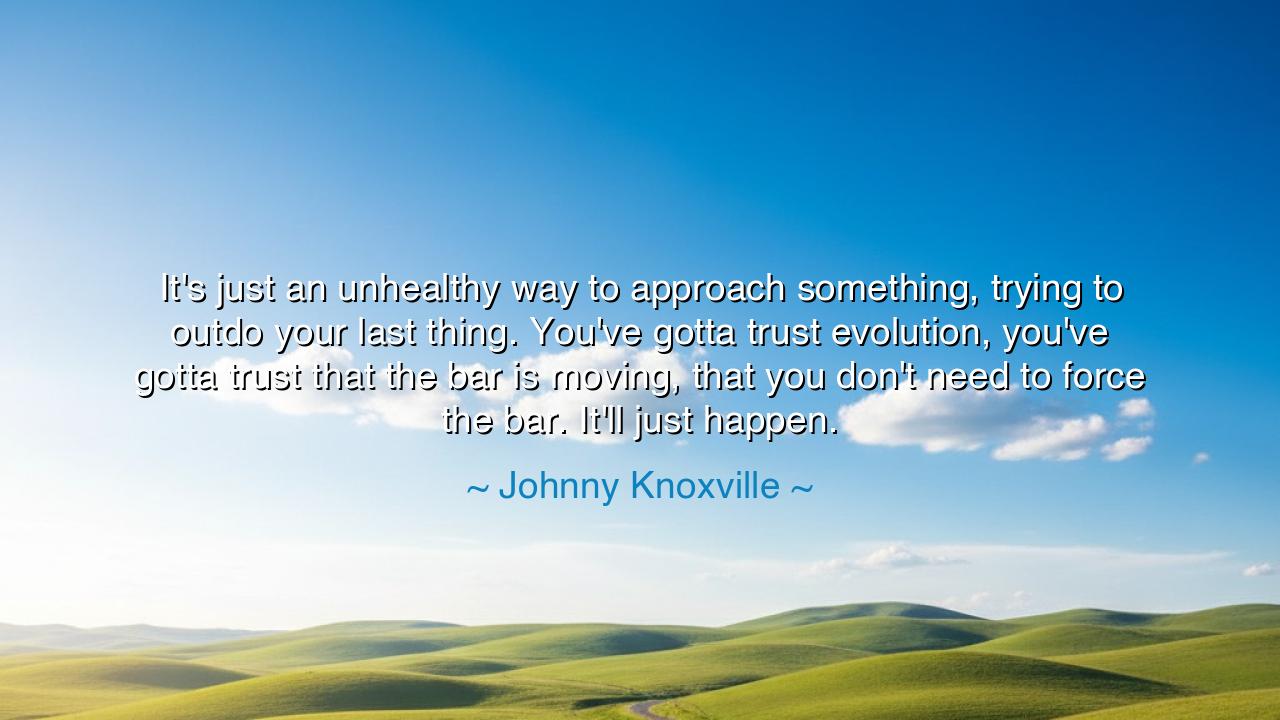
It's just an unhealthy way to approach something, trying to
It's just an unhealthy way to approach something, trying to outdo your last thing. You've gotta trust evolution, you've gotta trust that the bar is moving, that you don't need to force the bar. It'll just happen.






The words of Johnny Knoxville speak with the quiet wisdom of one who has danced upon the edge of risk and spectacle: “It’s just an unhealthy way to approach something, trying to outdo your last thing. You’ve gotta trust evolution, you’ve gotta trust that the bar is moving, that you don’t need to force the bar. It’ll just happen.” In these words lies a profound teaching about ambition, growth, and the dangers of ceaseless striving. To chase forever the shadow of one’s past achievements is to live in chains; but to trust in evolution, to believe that growth is natural and inevitable, is to live in freedom.
From the dawn of history, men and women have sought to surpass their former selves. The warrior sought to win greater battles, the orator to deliver greater speeches, the artist to paint brighter canvases. Yet many have perished under the weight of their own expectations, their spirits broken by the endless demand to rise higher. Knoxville warns us of this trap: that the pursuit of always “outdoing” the past can become a path of exhaustion, a devotion to a false idol. True greatness comes not from forcing the bar, but from trusting the natural flow of one’s journey.
Consider the tale of Icarus from ancient Greece. With wings fashioned from wax and feathers, he sought to soar higher, always higher, striving to surpass the limits placed upon him. But in forcing the bar beyond what was natural, he fell, consumed by the very sun that drew him upward. His tragedy endures as a lesson: ambition without patience, striving without wisdom, leads to ruin. Knoxville’s words echo this ancient truth: the bar rises with time, with learning, with life itself—you need not hurl yourself recklessly skyward.
And yet, there are those who embody the other path, who trusted evolution rather than forcing their growth. Think of Leonardo da Vinci, who did not demand of himself to outdo each invention, each painting, each design. Instead, he trusted the flow of curiosity, the gradual unfolding of mastery. He allowed his mind to move as rivers move—ever forward, never stagnant, but never violently forced. From this trust arose wonders that shaped the world. His life shows us that the bar indeed moves, and that it rises when we walk with it, not when we try to wrestle it upward.
Knoxville’s words are also born of his own world—a world of stunts, danger, and spectacle, where the temptation to go bigger, wilder, and riskier is constant. But even in that realm, wisdom whispers: if you force the bar, it breaks you. To live well is to recognize that creativity, like nature, grows best when nurtured, not coerced. Just as the tree grows upward by its inner law, not by the force of hands tugging at its branches, so does the human spirit evolve by trust, patience, and faith in its own unfolding.
The lesson is thus: ambition is good, but obsession is ruinous. We must resist the compulsion to measure each step against the last as though we were bound to endless competition with our own shadow. Instead, we must walk the road of growth with patience, honoring the truth that each new season brings its own increase, its own rise of the bar, without our frantic striving. In this way, we live not as slaves to yesterday, but as free travelers of today.
Practical actions follow: when you create, do not ask, “Is this greater than the last?” Instead ask, “Is this true to me now?” Trust that your work, your growth, your journey is evolving, even when it seems quiet or small. Practice patience with yourself, and resist the urge to force progress through comparison. Allow your evolution to unfold like dawn breaking—gradual, steady, unstoppable. In this trust lies freedom, and in this freedom lies the truest greatness.






TTTran Tuan
Johnny Knoxville’s words seem to suggest that progress doesn’t have to be a constant battle against yourself. Instead of focusing on surpassing your last achievement, it’s about trusting that things will naturally evolve. How much of our stress comes from this constant need to be better than before? Can we truly embrace this mindset and still be successful, or do we need some external push to keep improving?
TTThuy Trang
This quote highlights an important lesson about pacing and trusting the process. Constantly trying to outdo our last achievement can lead to burnout. But can we truly trust evolution in the same way Knoxville suggests, or do we also need to take active steps to ensure progress? It’s an interesting idea — that the bar will move on its own without forcing it — but how do we keep ourselves motivated during that process?
HNthai ha ngo
I like the perspective Johnny Knoxville offers here. It’s easy to fall into the trap of trying to outdo our previous work, but it can become exhausting and unsustainable. How do we develop the mindset of trusting evolution without feeling like we’re not pushing ourselves enough? Can letting things happen naturally really lead to better results, or do we still need to have that drive to improve?
TPthu pham
This quote from Johnny Knoxville really resonates with the idea of letting things unfold naturally, rather than forcing progress. It makes me think about the pressure many people feel to constantly outdo themselves, especially in creative fields. Is it healthier to trust in gradual progress and evolution, rather than striving for something bigger each time? How do we balance ambition with patience, especially when it comes to personal growth?